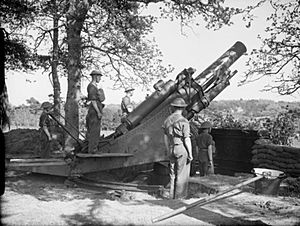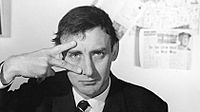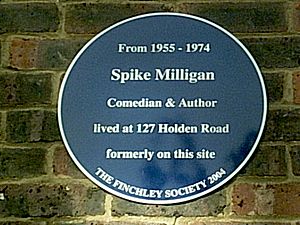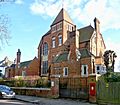Spike Milligan facts for kids
Quick facts for kids
Spike Milligan
|
|
|---|---|
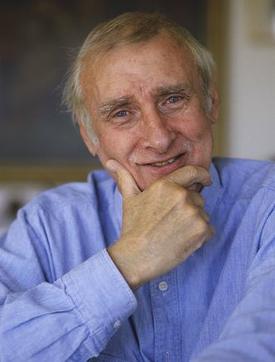
Milligan, c. 1990
|
|
| Born |
Terence Alan Milligan
16 April 1918 |
| Died | 27 February 2002 (aged 83) Rye, East Sussex, England
|
| Resting place | St Thomas's Church Winchelsea, East Sussex, England |
| Occupation |
|
| Years active | 1951–2002 |
| Spouse(s) |
|
| Children | 6 |
| Military career | |
| Allegiance | United Kingdom |
| Service/ |
|
| Years of service | 1940–1945 |
| Rank | Lance bombardier |
| Unit | Royal Artillery |
| Battles/wars | Second World War |
Terence Alan "Spike" Milligan (1918–2002) was a very talented Irish actor, comedian, writer, musician, and poet. He was born in British Colonial India and moved to England in 1931. He spent most of his life there, working and creating.
He didn't like his first name, Terence. So, he started calling himself "Spike" after hearing the band Spike Jones and his City Slickers on the radio.
Spike Milligan helped create, write, and star in the famous British radio comedy show The Goon Show. He played many funny characters like Eccles and Minnie Bannister. He was the first of the Goons to be born and the last one to pass away.
After The Goon Show, he brought his unique comedy to TV with Q5. This show was very silly and influenced other famous comedy groups like Monty Python's Flying Circus. He also wrote many books, including a funny story called Puckoon (1963). He wrote seven books about his time serving in World War II, starting with Adolf Hitler: My Part in His Downfall (1971). Spike also wrote many funny poems, especially for children, like Silly Verse for Kids (1959).
Contents
Early Life and Moving to England
Terence Alan Milligan was born in Ahmednagar, British India, on April 16, 1918. His father, Leo, was Irish and worked in the British Indian Army. His mother, Florence, was English. Spike spent his early years in places like Poona and Rangoon. He went to school in these cities.
His father's job meant the family lived quite well. Spike even said his dad "lived the life of a gentleman on sergeant's pay."
After his father's army job ended, the family moved to England. Spike remembered how cold and grey it was compared to India. They lived in Brockley, south east London, from 1931 when Spike was 12. His mother found it hard to manage with little money. Spike went to Brownhill Road School.
He started calling himself "Spike" because he loved the band Spike Jones and his City Slickers. After school, he worked as a clerk and played the cornet. He also joined the Young Communist League because he disliked Oswald Mosley's British Union of Fascists.
War Hero and Entertainer
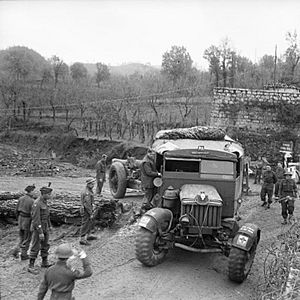
In the late 1930s and early 1940s, Spike Milligan was a jazz singer and musician. Then, he was called up for military service during World War II. He joined the Royal Artillery to fight against Nazi Germany. Even during the war, he wrote and performed comedy sketches to entertain the troops.
He and his friend Harry Edgington created funny, surreal stories. These stories were full of puns and strange logic. They helped them deal with the boredom of army life. Spike was a talented musician, playing drums, guitar, and trumpet. He even won a singing competition.
During the war, Milligan was a signaller in the 56th Heavy Regiment, Royal Artillery. His unit used large, older guns. He wrote in his book that during training, they had to shout "bang" because they had no real shells.
His unit later got newer guns and fought in North Africa and Italy. Spike was promoted to lance bombardier. But he was injured in Italy during the Battle of Monte Cassino. He was hit by a mortar and suffered from shell shock. He was then demoted by his commanding officer. Spike felt this officer disliked him because he kept the soldiers' spirits high.
After his injury, Spike worked in various military jobs in Italy. He eventually became a full-time entertainer. He played guitar in a jazz and comedy group called The Bill Hall Trio. They performed for the troops. After the war, he stayed in Italy with the trio for a short time before returning to Britain. While performing, he started writing funny versions of plays. These ideas later became The Goon Show, with his friends Peter Sellers, Harry Secombe, and Michael Bentine.
Radio Star: The Goon Show
In the late 1940s, Spike Milligan tried to get into radio as a performer or writer. His first success was writing for comedian Derek Roy. Then, Spike, Peter Sellers, Harry Secombe, and Michael Bentine teamed up for a new comedy show. This show became The Goon Show.
The first episode aired on May 28, 1951, on the BBC Home Service. At first, the BBC called it Crazy People. Spike became a main performer in almost all Goon Show episodes. He played many characters, including Eccles and Minnie Bannister. He was also the main writer for most of the scripts. He often wrote with others, like Larry Stephens and Eric Sykes.
The Goon Show was recorded in front of a live audience. Spike would play the trumpet before the show to warm up the crowd. For the first few years, shows were recorded live. This meant the actors had to stick to the script. But later, the BBC started using magnetic tape. This allowed Spike to be more creative. They could edit the tapes, so the cast could make things up on the spot. Tape also helped create amazing sound effects.
The show's success made Spike a national star. But writing and performing the series was very demanding. He faced health challenges during this time. He later said the pressure of The Goon Show affected his well-being.
TV Shows and Films
Spike Milligan also worked a lot in television. He wrote and performed in many shows. His first TV attempt to bring Goon Show humor to TV was The Idiot Weekly, Price 2d (1956). This was followed by A Show Called Fred and Son of Fred.
In 1963, The Telegoons brought the Goons to TV using puppets. Spike, Sellers, and Secombe provided the voices. This show was filmed and has been saved in the BBC archives.
Spike's next big TV show was The World of Beachcomber (1968). In 1969, he starred in a sitcom called Curry and Chips. This show tried to make fun of racist attitudes. However, it caused many complaints because of its language and was cancelled after six episodes.
Later, Spike wrote and starred in the innovative Q... (TV series)|Q' TV series. This show is seen as a major influence on Monty Python's Flying Circus. Spike felt the BBC didn't support the series enough.
Spike also narrated children's animated series. He narrated The Ratties (1987), which his daughter Laura helped create. He also voiced characters in Wolves, Witches and Giants (1995–1998). This show was very popular and aired in over 100 countries.
Poet and Writer
Spike Milligan wrote many poems, often in a funny, nonsensical style. Comedian Stephen Fry called his poetry "absolutely immortal." One of his most famous poems, "On the Ning Nang Nong", was voted the UK's favorite comic poem in 1998. This poem, set to music, was very popular in Australia on the children's show Playschool. It is also one of the most taught poems in UK primary schools.
He also wrote serious poetry, collected in Open Heart University. His novel Puckoon is well-known. He wrote a series of funny war memoirs, including Adolf Hitler: My Part in His Downfall (1971) and "Rommel?" "Gunner Who?": A Confrontation in the Desert (1974). These books cover his time in the army and his return to the UK.
Spike also wrote comedy songs, like "Purple Aeroplane," a parody of the Beatles' "Yellow Submarine".
On Stage
Treasure Island
Spike Milligan played Ben Gunn in the play Treasure Island at the Mermaid Theatre. This was his first serious acting role. The play was performed annually for several years. In 1968, Barry Humphries and William Rushton also starred. Barry Humphries said Spike's performance as Ben Gunn was his best. He would often make up new lines and make the audience laugh.
The Bedsitting Room
While performing in Treasure Island, Spike started talking about an idea for a play about a world after a nuclear disaster. This became The Bedsitting Room, which he co-wrote with John Antrobus. It first opened in Canterbury in 1962. It was a big success and was later made into a film in 1969.
Oblomov
Spike wanted to try more serious acting roles. He felt a connection with the character Oblomov, who didn't want to leave his bed. He rehearsed for the play Oblomov in 1964.
On the first night, Spike forgot his lines. He started making things up, turning the serious play into a comedy show. He even shouted to the audience and interacted with them. The play became very popular because it was different every night. It was renamed Son of Oblomov and moved to a bigger theatre. It ran for 559 performances.
Even the Queen and her family came to see it. Spike made jokes with them from the stage. He even threw his slipper at Peter Sellers, who was sitting with the royals! The Queen reportedly declined his request to knight him on stage.
His Legacy
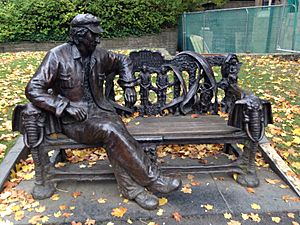
Spike Milligan was a strong supporter of environmental causes. He spoke out against unnecessary noise pollution. He also campaigned against domestic violence.
He was a close friend of Charles III (then the Prince of Wales). Prince Charles was a big fan of Spike's comedy. Spike was made an honorary Knight Commander of the Order of the British Empire (KBE) in 2001.
Even at the end of his life, Spike kept his dark humor. After his friend Harry Secombe died, he joked, "I'm glad he died before me, because I didn't want him to sing at my funeral." (A recording of Secombe singing was played at Spike's memorial service.)
Spike Milligan died from kidney failure on February 27, 2002, at age 83. He was buried in Winchelsea, East Sussex. He famously wanted his headstone to say, "I told you I was ill." The church didn't allow it in English, so it was put in Gaelic: Dúirt mé leat go raibh mé breoite.
Many people remember Spike Milligan's genius. In a 2005 poll, he was voted among the top 50 comedians by other comedians. In 1999, a BBC poll voted him the "funniest person of the last 1,000 years."
Eddie Izzard called him "The Godfather of Alternative Comedy." Members of Monty Python greatly admired him. John Cleese said, "Milligan is the Great God to all of us."
Spike's parents later moved to Woy Woy in Australia. He visited them often and made radio and TV shows there. He even called Woy Woy "the largest above-ground cemetery in the world" as a joke. A bridge and a library room in Woy Woy are named after him.
Radio Comedy Shows
- The Goon Show (1951–1960)
- The Idiot Weekly (1958–1962)
- The Omar Khayyam Show (1963–1964)
- Milligna (1972)
- The Milligan Papers (1987)
- Flywheel, Shyster, and Flywheel (1990)
Television Comedy Shows
- The Idiot Weekly, Price 2d
- A Show Called Fred
- Son of Fred
- The World of Beachcomber
- The Q series: Q5, Q6, Q7, Q8, Q9, and There's a Lot of It About
- Curry and Chips
Other Notable Television Work
- Six-Five Special (1957) – played an inventor and a butcher.
- The Marty Feldman Comedy Machine – co-wrote and performed sketches.
- The Phantom Raspberry Blower of Old London Town – a serial in The Two Ronnies.
- The Muppet Show (1979) – special guest star.
- The Ratties (1987) – narrated this children's cartoon.
- Wolves, Witches and Giants (1995–1998) – narrated this cartoon and voiced characters.
Theatre Performances
- Treasure Island (1961, 1973–1975)
- The Bedsitting Room (1963, 1967) – co-written with John Antrobus.
- Oblomov (1964) – later called Son of Oblomov.
Film Roles
| Year | Title | Role |
|---|---|---|
| 1951 | Penny Points to Paradise | Spike Donnelly |
| 1952 | Down Among the Z Men | Eccles |
| 1956 | The Case of the Mukkinese Battle-Horn | Sgt. Brown / Eccles / Catchpole Burkington / Minnie Bannister (voices) |
| 1960 | Watch Your Stern | Ranjid |
| 1960 | The Running Jumping & Standing Still Film | Himself |
| 1962 | Postman's Knock | Harold Petts |
| 1969 | The Bed Sitting Room | Mate |
| 1969 | The Magic Christian | Traffic Warden 27 |
| 1971 | The Magnificent Seven Deadly Sins | Tramp |
| 1972 | Alice's Adventures in Wonderland | Gryphon |
| 1973 | Adolf Hitler: My Part in His Downfall | Leo Milligan |
| 1973 | Digby, the Biggest Dog in the World | Dr. Harz |
| 1973 | The Three Musketeers | M. Bonacieux |
| 1975 | The Great McGonagall | William McGonagall |
| 1977 | The Last Remake of Beau Geste | Crumble |
| 1977 | Dot and the Kangaroo | Mr. Platypus (voice) |
| 1978 | The Hound of the Baskervilles | Policeman |
| 1979 | Monty Python's Life of Brian | Spike |
| 1981 | History of the World, Part I | Monsieur Rimbaud |
| 1983 | Yellowbeard | Flunkie |
| 1988 | The Ratties | Narrator (voice) |
| 1995–1998 | Wolves, Witches and Giants | Narrator, Molly, The Giant, The Giant's Wife |
| 2000 | Gormenghast | De'Ath |
Books by Spike Milligan
Goon Show Books
- The Goon Show Scripts (1972)
- More Goon Show Scripts (1973)
- The Book of the Goons (1974)
Novels
- Puckoon (1963)
- The Looney: An Irish Fantasy (1987)
Funny Versions of Classic Books
- The Bible—the Old Testament According to Spike Milligan (1993)
- Lady Chatterley's Lover According to Spike Milligan (1994)
- Wuthering Heights According to Spike Milligan (1994)
- Black Beauty According to Spike Milligan (1996)
- Frankenstein According to Spike Milligan (1997)
- Robin Hood According to Spike Milligan (1998)
- Treasure Island According to Spike Milligan (2000)
Children's Books
- Bald Twit Lion (1968)
- Badjelly the Witch (1973)
- Dip the Puppy (1974)
- Sir Nobonk and the Terrible Dreadful Awful Naughty Nasty Dragon (1982)
- Silly Verse for Kids (1959)
- A Book of Milliganimals (1968)
War Memoirs
- Adolf Hitler: My Part in His Downfall (1971)
- "Rommel?" "Gunner Who?" (1974)
- Monty: His Part in My Victory (1976)
- Mussolini: His Part in My Downfall (1978)
- Where Have All the Bullets Gone? (1985)
- Goodbye Soldier (1986)
- Peace Work (1991)
Images for kids
See also
 In Spanish: Spike Milligan para niños
In Spanish: Spike Milligan para niños
 | Emma Amos |
 | Edward Mitchell Bannister |
 | Larry D. Alexander |
 | Ernie Barnes |


